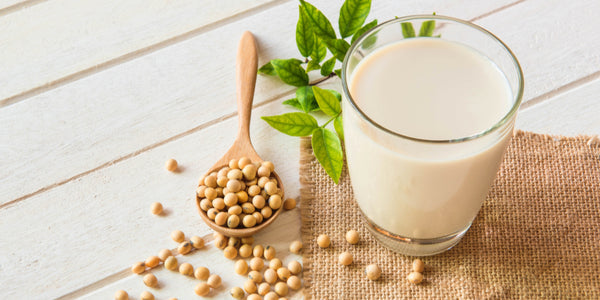
Aging women experience menopause, a natural end of their menstruation cycle. It is also known as "the change" where periods stop and women are no longer able to conceive.
Menopause can bring unpleasant symptoms that can affect both physical and emotional health, such as hot flashes and mood swings. Long-term consequences include bone loss, fractures, and heart disease.
However, there are many treatment options available, including lifestyle modifications and medications. Medications, particularly hormone replacement therapy, can help manage menopausal symptoms by counteracting estrogen loss.
But serious health problems can occur when taking hormone therapy. These harmful risks include heart attacks, certain forms of cancer, and dementia. Besides, overall data suggests the therapy may be doing more harm than good.
Adopting a healthy lifestyle, though, can also alleviate symptoms and reduce the risks of health complications. Women may turn to foods to help perimenopausal symptoms and ease the menopause transition, too.
Soy and soy products are of popular interest to relieve menopausal symptoms but do they actually work? We are looking at the research and whether or not menopausal women may benefit from a more natural approach.
Soy Products for Menopause Relief
As women approach their late 30s, the ovaries start making less estrogen and progesterone. These female-dominant sex hormones regulate menstruation and ovulation and responsible for the ceasing of menstruation. The decline of these hormone levels is mostly responsible for common menopause symptoms, including:
• Hot flashes
• Night sweats
• Mood swings
• Chills
• Depression and anxiety
• Vaginal dryness
• Sleep disturbances
• Difficulty concentrating
• Thinning hair
• Dry skin
• Low sexual function and drive
This is where soy, a type of bean, comes into play. The edible bean is cultivated into numerous soy products, including soy milk and cheese, tofu, and tempeh. Additional sources of processed soy include veggie burgers and hotdogs.
Soy and soy products contain isoflavones, a type of phytoestrogen, which are plant-based chemicals resembling the structure of estrogen. The presence of isoflavone in the body may counteract the loss of estrogen even during perimenopause.
Soy and Perimenopause
Perimenopause is the term given to the years that lead up to menopause, or essentially the transitional period. Women often experience this menopausal age around 50. It may occur as early as age 40 for others. The average length of perimenopause is 4 years, though it may last a few months or 10 years for some women.
The ovary starts to decline in function and an egg is no longer released consistently each month. Without regular egg release, women start experiencing irregular periods and common symptoms of menopause. While menopause cannot be cured, diet modifications, including the intake of soy, may be helpful. Here is what some of the research shows regarding soy for perimenopause, menopause, and postmenopausal symptoms:
• A pilot study examined the effect of soy isoflavone supplementation on menopausal symptoms in 29 perimenopausal and 21 postmenopausal women. They were prescribed 100 milligrams of soy isoflavones for 12 weeks and given a rating scale questionnaire before and after treatment.
After treatment, total scores improved significantly by almost 20 and 13 percent in the perimenopausal and postmenopausal women, respectively. The greatest improvement was seen in scores related to hot flashes.
• According to research in Mayo Clinic Proceedings, though, some studies reveal a minimal effect of soy on hot flashes. This includes soy reducing hot flashes by 45 percent, placebo by 30 percent, and about 70 percent with estrogen replacement therapy.
• A recent meta-analysis, featuring over 500 relevant studies, concluded phytoestrogens can reduce the frequency of hot flushes in menopausal women. This is without serious side effects often caused by hormone therapy.
• Another meta-analysis suggests phytoestrogen supplementation was associated with reductions in the frequency of hot flashes and vaginal dryness. However, there was no significant reduction in night sweats.
All-in-all, soy may be a potentially effective method to manage menopausal symptoms. What's more, soy intake showed to be safe and may lead to other health benefits.
Additional Recommendations On Soy
Beyond menopausal relief, research has explored soy in a number of health conditions, including heart disease. Others may tread cautiously with soy with speculated links to cancer and thyroid function.
• Heart disease: Soy mostly became a popularized dietary component in a Westernized diet in 1999. This is the year the FDA granted health claims could associate soy intake and a lower risk of coronary heart disease.
• Thyroid function: Some warn on the effects of soy protein and soybean isoflavones on thyroid function. But little evidence shows soy and soy isoflavone has effect on thyroid function in healthy people with normal iodine status. So as long a person's iodine intake is adequate, soy is unlikely to be a concern.
Food sources of iodine include iodized salt, dairy products, eggs, saltwater fish, and soy itself. Multivitamins and supplements may contain a significant amount of iodine, too.
• Cancer: Soy has also been under investigation for causing breast cancer. High levels of estrogen are said to increase breast cancer risk due to the isoflavones supposedly mimicking estrogen in the body. What's more, soy may be beneficial for cancer prevention. Data has correlated a decrease of breast cancer risk in Chinese women, a culture in which soy intake is frequent.
The American Cancer Association helps set the record straight in relation to the link between soy and cancer risk. They suggest that available evidence does not point to any dangers of eating soy. Health benefits appear to outweigh any potential risk, too.
And according to Marji McCullough, a strategic director of nutritional epidemiology for the American Cancer Society, soy foods are healthy and safe. She does advise, though, against taking soy supplements until more research is done. This is because soy supplements contain much higher isoflavone concentrations than food. Supplemented soy products also generally lack in fiber and valuable nutrients.
Soy can be a valuable dietary component, specifically in the absence of a soy allergy. Edamame, tempeh, and other soy products are rich in fiber and valuable vitamins and minerals. These include, but are not limited to, manganese, phosphorous, potassium, and vitamin K.
Whole soy products also supply plant-based protein. Adequate protein is important for weight loss and counteracting the muscle loss that often comes with age. Plant-based protein is especially vital for individuals following a vegetarian or vegan diet or simply lowering animal proteins.
Truly, soy nutrition is an admirable contribution to a healthy diet. And the most benefit of soy comes when eating it in its whole, most natural form. It should also complement other nutritious food sources, including whole grains, fruits, and vegetables.
If concerned about soy and its isoflavone content, talk to your doctor or dietitian for individual recommendations. They can also help identify other ways to manage menopausal symptoms, which may include specific diet, exercise, and other lifestyle factors.







